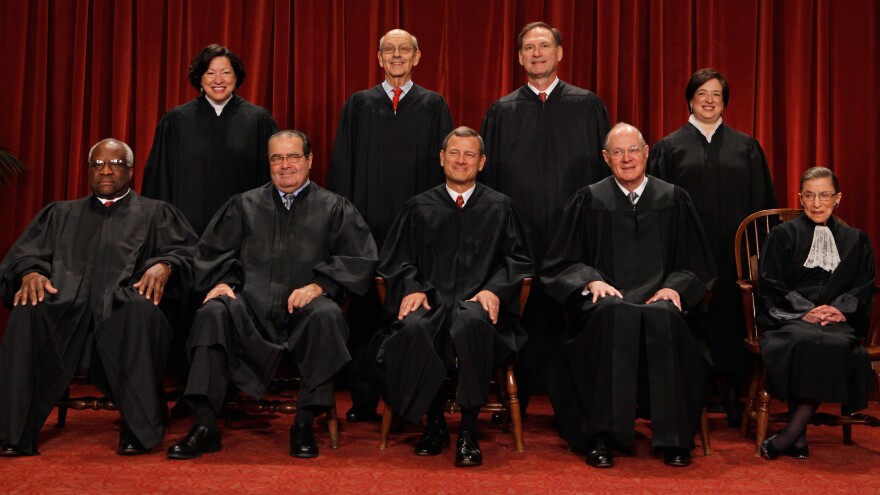An eventful term of the U.S. Supreme Court ended Thursday with the landmark 5-4 ruling affirming the legality of the Affordable Care Act. Much attention has focused on the pivotal role of Chief Justice John Roberts in the case — and whether some elements of his opinion in the health care ruling will have a conservative influence on future cases.
But the health care case wasn't the only important decision rendered by the court during its recent term. On Monday's Fresh Air, Adam Liptak, Supreme Court reporter for The New York Times, provides a roundup of the past year's most important Supreme Court decisions — including ones addressing health care reform, immigration law, campaign finance rules, the access of Guantanamo detainees to the courts, and the rights of criminal defendants while plea bargaining.
Liptak tells Dave Davies that the court voted unanimously in 44 percent of its cases this term, which is not unusual. What was unusual is that the court voted unanimously in major decisions — and not just trivial matters.
"This year, they were unanimous in cases that really mattered," he says. "And moreover, in many of these cases, they were unanimous in rejecting the position of the federal government and the Obama administration. And [that's] a sign that maybe the usual political explanations [for the court] don't quite work."
Liptak points to a case about whether employment discrimination laws applied to churches and religious schools who wanted to choose their religious leaders without interference from the government.
"There the court unanimously recognized a ministerial exception which says employment discrimination laws don't apply to such institutions, at least for ministers, rabbis and also for teachers of religion," says Liptak. "[The case] indicates, I think, that the chief justice may have done some work early in the term getting people united ... behind some broad ideas."
Much has been written about Chief Justice Roberts' decision to side with the four more liberal members of the Court on the health care decision last week.
"He is getting it from all sides, but one way to think about it was that it was a brilliant compromise," says Liptak. "He gave something to everybody."
Roberts upheld the core of the health care law on the grounds that Congress was authorized to do so under its power to levy taxes. At the same time, he and the four dissenting justices rejected the argument that the individual mandate was justified by Congress' ability to regulate interstate commerce. By rejecting that argument, the court's four more conservative members and Roberts breathed new life into a theory of the Commerce Clause, which could have the potential to affect cases down the road.
"On the one hand, the bottom line is that President Obama's signature health care legislation survives, and that's a huge victory for him," says Liptak. "On the other hand, it may be said that the chief justice put together these overlapping coalitions that gave a little something to everybody."
Interview Highlights
On Justice Roberts' legacy
"I do think John Roberts takes himself very seriously, and he should, as the custodian of the prestige and legitimacy of the branch of government that he heads. How much that entered his calculations in [the health care case], only he knows. But it's a perfectly appropriate consideration to make sure your branch, which is meant to be disinterested and apolitical and judicial, should not be perceived as yet a third political branch of government. And in the wake of ideological 5-4 decisions like Bush v. Goreand Citizens United, the Court has left itself open to that interpretation. And had it struck down the health care law 5-4 along ideological lines, there would have been some substantial attack on the credibility of the court."
On the Citizens Unitedcase
"Liberals love to hate Citizens United and love to blame it for everything. And it may be blameworthy, depending on your perspective, for allowing corporations and unions to spend unlimited sums on independent expenditures supporting individual candidates. But Citizens United can't be blamed for everything, and in fact, a part of Citizens United in an 8-1 ruling said that it endorsed the disclosure requirements put forward, that it's pro-disclosure, that disclosure plays an important role in the First Amendment analysis of political speech. And I think if you think about it for a second, that makes perfect sense. If you take the First Amendment view that it's a good idea to let everybody say what they have to say, and people can make up their own minds about who's right and who's wrong, it sure helps to know who's doing the talking. I might think differently about a proposition if I know someone is saying it who has a stake — financial or otherwise — in saying it."
Copyright 2020 Fresh Air. To see more, visit Fresh Air.

